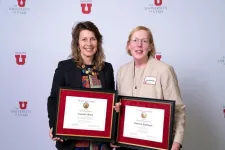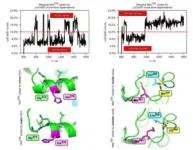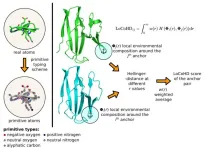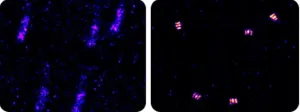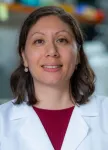(Press-News.org)
Three Huntsman Cancer Institute researchers have recently been recognized for their work as outstanding faculty members at the University of Utah (the U).
Kim Kaphingst, ScD, director of cancer communication research at Huntsman Cancer Institute and professor of communication at the U, and June Round, PhD, investigator at Huntsman Cancer Institute and professor of microbiology and immunology at the U, were both granted the 2024 Distinguished Research Award. The faculty prize is given annually to scholars who exemplify exceptional research.
Kaphingst’s group explores cancer communication, particularly how to educate patients and families who may have inherited cancer syndromes. Kaphingst and her colleagues also look for strategies that will recruit a wider pool of patients into clinical trials.
“Huntsman Cancer Institute is a unique institution where a communications professor can conduct research on genetic testing services and other health services, integrating multiple disciplines. This award really shows how successful our work has been here,” says Kaphingst. “It is an honor to receive the Distinguished Research Award. My hope is that our investigations expand the reach of cancer genetic information to all in the area we serve.”
Round and her team study how microbiota—bacteria, fungi, and viruses that live on and in the human body—impact cancer outcomes. Round, an immunologist, is interested in the presence of gut microbes that may prevent colon and pancreatic cancers.
“We believe that people who develop cancer are lacking a lot of beneficial organisms. Whereas people who don't get cancer have organisms that are promoting a healthy immune response. The question is: can we find those organisms and give them to people who have the disease?” says Round. “I think the Distinguished Research Award validates that this work is important.”
The Distinguished Research Award is bestowed by the Office of the Vice President for Research. A committee reviews nominations before deciding on three winners, who each receive a $10,000 grant. Gabriel Bowen, PhD, professor of geology at the U, is the third awardee.
“We received more nominees for the Distinguished Research Award this year than ever before,” says Jakob D. Jensen, PhD, a member of the Cancer Control and Population Sciences Program at Huntsman Cancer Institute and associate vice president for research at the U. “We are proud to honor three outstanding faculty from diverse disciplines who are making an impact in Utah and beyond.”
Neli Ulrich, PhD, MS, chief scientific officer and executive director of the Comprehensive Cancer Center at Huntsman Cancer Institute and professor of population health sciences at the U, was also named a Distinguished Professor at the U.
Distinguished Professor is a special honored rank for tenured faculty. Professors given the title are lauded for both their high level of research and dedication to teaching. Ulrich is an internationally renowned epidemiologist, widely recognized for her work in colorectal cancer causes and survivorship.
“I am immensely grateful to my colleagues at the U for this honor,” says Ulrich. “This award recognizes the decades-long work of my research team, with colleagues from surgery, oncology, epidemiology, basic sciences, and other disciplines. I’m also thrilled to see Huntsman Cancer Institute investigators Kaphingst and Round praised for their extraordinary accomplishments. Their revolutionary research in cancer care and prevention epitomizes the work we do at Huntsman Cancer Institute, and I look forward to the future impact of their work.”
About Huntsman Cancer Institute at the University of Utah
Huntsman Cancer Institute at the University of Utah (the U) is the National Cancer Institute-designated Comprehensive Cancer Center for Utah, Idaho, Montana, Nevada, and Wyoming. With a legacy of innovative cancer research, groundbreaking discoveries, and world-class patient care, we are transforming the way cancer is understood, prevented, diagnosed, treated, and survived. Huntsman Cancer Institute focuses on delivering a cancer-free frontier to all communities in the area we serve. We have more than 300 open clinical trials and 250 research teams studying cancer at any given time. More genes for inherited cancers have been discovered at Huntsman Cancer Institute than at any other cancer center. Our scientists are world-renowned for understanding how cancer begins and using that knowledge to develop innovative approaches to treat each patient’s unique disease. Huntsman Cancer Institute was founded by Jon M. and Karen Huntsman.
END
In a paper recently published in Nature Communications, the HUN-REN-ELTE Protein Modeling Research Group (Institute of Chemistry) has laid the foundations for a mathematical method, allowing the computer-assisted comparison of the three-dimensional structures of proteins. The method is unique in that while the alternatives available so far only took into account the position of the atoms, the new technique, called LoCoHD (Local Composition Hellinger Distance), also includes the chemical information of the atoms.
Proteins are molecular machines that carry out processes necessary for cells to function, acting as molecular switches, transcribing information ...
When trying to measure molecular structures with nanometer precision, every bit of noise shows up in the data: someone walking past the microscope, tiny vibrations in the building and even the traffic outside. A new processing technique removes noise from optical microscope data in real time, allowing scientists to track individual molecules over 10 times more precisely than was possible before.
A team of bioengineering researchers at the University of Illinois Urbana-Champaign has introduced an algorithm called adaptive intersection maximization, or AIM, that removes high-frequency ...
Researchers at Rice University have revealed a previously unknown function of opioid receptors in the development of the enteric nervous system (ENS), often referred to as the “brain in the gut.” This discovery challenges conventional understanding of opioid receptors, shedding new light on their significance beyond pain management and addiction.
Led by Rosa Uribe, an assistant professor of biosciences at Rice and a Cancer Prevention and Research Institute of Texas (CPRIT) Scholar, the research team identified the genes critical for ENS development by conducting a series of experiments using zebrafish ...
CLEVELAND - Researchers from Cleveland Clinic and IBM recently published findings in the Journal of Chemical Theory and Computation that could lay the groundwork for applying quantum computing methods to protein structure prediction. This publication is the first peer-reviewed quantum computing paper from the Cleveland Clinic-IBM Discovery Accelerator partnership.
For decades, researchers have leveraged computational approaches to predict protein structures. A protein folds itself into a structure that determines how it functions and binds to other ...
WHAT: Researchers have, for the first time, visualized the full network of blood vessels across the cortex of awake mice, finding that blood vessels rhythmically expand and contract leading to “waves” washing across the surface of the brain. These findings, funded by the National Institutes of Health (NIH), improve the understanding of how the brain receives blood, though the function of the waves remains a mystery.
A network of elastic and actively pumping vessels carrying oxygenated blood span the surface of the brain before entering the cortex. There, they feed into a second network of capillaries that supply oxygen deeper into ...
More out-of-state women, largely from Texas and Alaska, are traveling to Washington state to obtain an abortion than was the case before the U.S. Supreme Court struck down the constitutional right to abortion, according to research published today in JAMA Network Open.
The study tracked the number of abortions performed at the Cedar River Clinics, a large network of care sites in Washington state, both before and after the 2022 Dobbs decision.
Researchers found a 50% increase in out-of-state patients (from 4% to 6%) and documented an average one-week delay in care for all patients seeking ...
SAN ANTONIO (May 29, 2024) – SARS-CoV-2, the virus that causes COVID-19 disease, continues to evolve and evade current vaccine and therapeutic interventions. A consortium of scientists at Texas Biomedical Research Institute (Texas Biomed), the University of Alabama at Birmingham (UAB) and Columbia University have developed a promising new human monoclonal antibody that appears a step closer to a universal antibody cocktail that works against all strains of SARS-CoV-2.
“This antibody worked against the original SARS-CoV-2 strain, Omicron and SARS-CoV, providing ...
EMBARGOED FOR RELEASE UNTIL 4 P.M. ET, WEDNESDAY, MAY 29, 2024
MINNEAPOLIS – While older drugs for epilepsy, taken while pregnant, have been shown in previous research to affect the creative thinking of children, a new study finds no effects on creativity for children born to those taking newer epilepsy drugs. This study is published in the May 29, 2024, online issue of Neurology®, the medical journal of the American Academy of Neurology.
Overall, the study found no effects on the children’s creative abilities or their executive function, which is a person’s ability to plan, focus, and manage multiple tasks. However, when ...
EMBARGOED FOR RELEASE UNTIL 4 P.M. ET, WEDNESDAY, MAY 29, 2024
MINNEAPOLIS – People who report early memory problems and whose partners also suspect they have memory problems have higher levels of tau tangles in the brain, a biomarker associated with Alzheimer’s disease, according to a study published in the May 29, 2024, online issue of Neurology®, the medical journal of the American Academy of Neurology.
Subjective cognitive decline is when a person reports memory and thinking problems before any decline is large enough to show up on standard tests.
“Understanding the earliest signs of Alzheimer’s disease is even more important ...
Researchers found that reports from patients and their partners about cognitive decline were associated with the accumulation of tau, a hallmark of Alzheimer’s disease
A new study adds further evidence that when a patient or family member notices signs of persistent memory loss, it’s important to speak with a doctor. While there are many reasons why someone’s memory may change, researchers from Mass General Brigham who are studying patients prior to diagnosis with Alzheimer’s disease found changes in the brain when patients and their study partners—those who could answer questions about their ...
